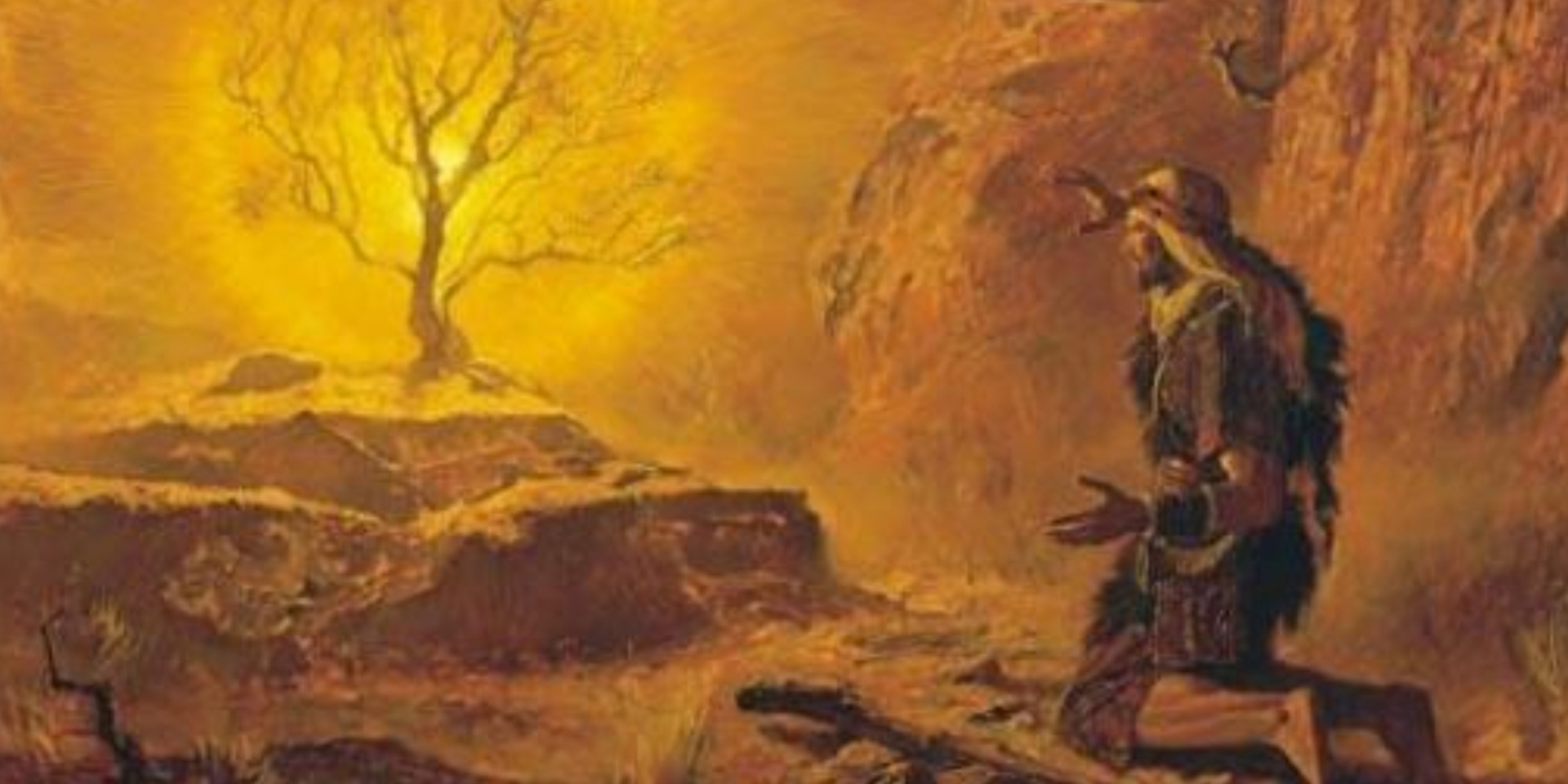
In different churches this Sunday is called Trinitatis, or trinity sunday; The Sunday on which there is special attention to the unity of God in the Father, the Son, and the Holy Spirit.
Exodus 3:1-6 NASB
¹Now Moses was pasturing the flock of Jethro his father-in-law, the priest of Midian; and he led the flock to the west side of the wilderness and came to Horeb, the mountain of God.
²The angel of the Lord appeared to him in a blazing fire from the midst of a bush; and he looked, and behold, the bush was burning with fire, yet the bush was not consumed.
³So Moses said, “I must turn aside now and see this marvelous sight, why the bush is not burned up.”
⁴When the Lord saw that he turned aside to look, God called to him from the midst of the bush and said, “Moses, Moses!” And he said, “Here I am.”
⁵Then He said, “Do not come near here; remove your sandals from your feet, for the place on which you are standing is holy ground.”
⁶He said also, “I am the God of your father, the God of Abraham, the God of Isaac, and the God of Jacob.” Then Moses hid his face, for he was afraid to look at God.
Study
Verse 1
Moses kept the flock.
The Hebrew expresses that this was his regular occupation.
Flock
Understand by “flock” either sheep or goats, or the two intermixed. Both anciently and at the present day the Sinaitic pastures support these animals, and not horned cattle.
Of Jethro, his father-in-law.
The word translated “father-in-law” is of much wider application, being used of almost any relation by marriage.
▪︎ Zipporah uses it of Moses in Exodus 4:25, 26;
▪︎ in Genesis 19:12, 14, it is applied to Lot’s “sons-in-law;”
▪︎ in other places it is used of “brothers-in-law.”
Its application to Jethro does not prove him to be the same person as Reuel, which the difference of name renders improbable.
He was no doubt the head of the tribe at this period, having succeeded to that dignity, and to the priesthood, when Reuel died.
He may have been either Reuel’s son or his nephew.
The backside of the desert,
i.e. “behind” or “beyond the desert,” across the strip of sandy plain which separates the coast of the Elanitic Gulf from the mountains, to the grassy regions beyond.
He came to the mountain of God, even Horeb.
Rather, “the mountain of God, Horeb-way,” or “towards Horeb.”
By “the mountain of God” Sinai seems to be meant. It may be so named either by anticipation (as “the land of Rameses” in Genesis 47:11), or because there was already a sanctuary there to the true God, whom Reuel and Jethro worshipped (Exodus 18:12).
Verse 2.
The angel of the Lord.
Literally, “an angel of Yahweh.”
Taking the whole narrative altogether, we are justified in concluding that the appearance was that of “the Angel of the Covenant” or “the Second Person of the Trinity himself;” but this is not stated nor implied in the present verse.
We learn it from what follows.
The angel “appeared in a flame of fire out of the midst of the thorn-bush” – not out of “a thorn-bush – which may be explained by there being only one on the spot, which however seems improbable, as it is a common tree; or by Moses having so often spoken of it, that, when he came to write to his countrymen, he naturally called it “the bush,” meaning “the bush of which you have all heard.”
So St. John says of the Baptist (John 3:24) that “he was not yet cast into the prison, meaning, prison into which you all know that he was cast.
Seneh, the word translated “bush,” is still the name of a thorny shrub, a species of acacia, common in the Sinaitic district.
Verse 3.
I will turn aside.
Suspecting nothing but a natural phenomenon, which he was anxious to investigate.
The action bespeaks him a man of sense and intelligence, not easily scared or imposed upon.
Verse 4.
When the Lord saw… God called.
This collocation of words is fatal in the entire Elohistic and Jehovistic theory, for no one can suppose that two different writers wrote the two clauses of the sentence.
Nor, if the same term was originally used in both clauses, would any reviser have altered one without altering both.
Out of the midst of the bush.
A voice, which was the true voice of God, appeared to Moses to proceed out of the midst of the fire which enveloped the thorn-bush.
An objective reality is described, not a vision.
Moses, Moses.
The double call implies urgency. Compare the call of Samuel (1 Samuel 3:10).
Verse 5.
Draw not nigh.
The awful greatness of the Creator is such that his creatures, until invited to draw near, are bound to stand aloof.
Moses, not yet aware that God himself spoke to him, was approaching the bush too close, to examine and see what the “great thing” was. (See ver. 3.)
On the general unfitness of man to approach near to holy things, see the comment on Exodus 19:12.
Put off thy shoes.
Rather, “thy sandals.” Shoes were not worn commonly, even by the Egyptians, until a late period, and would certainly not be known in the land of Midian at this time.
The practice of putting them off before entering a temple, a palace, or even the private apartments of a house, was, and is, universal in the East – the rationale of it being that the shoes or sandals have dust or dirt attaching to them.
The command given to Moses at this time was repeated to Joshua (Joshua 5:15).
Holy ground.
Literally, “ground of holiness ” – ground rendered holy by the presence of God upon it – not “an old sanctuary,” as some have thought, for then Moses would not have needed the information.
The God of thy father.
“Father” here is used collectively, meaning forefathers generally, a usage well known to Hebraists. (Compare Exodus 15:2)
The God of Abraham, etc., i.e. the God who revealed himself to Abraham, Isaac, and Jacob, and entered into covenant with them (Genesis 15:1-21; Genesis 26:2-5; Genesis 35:1-12).
The conclusion which our Blessed Lord drew from this verse (Matthew 22:32) is not directly involved in it, but depends on his minor premiss, “God is not the God of the dead, but of the living.”
Moses hid his face.
A natural instinctive action.
So Elijah, on the same site (1 Kings 19:13) and the holy angels before God’s throne in heaven (Isaiah 6:2).
In the religious system of Rome, the augurs when discharging their office, and all persons when offering a sacrifice, veiled their heads.
× 0 ×
The years of the life of Moses are divided into three groups of forty years.
▪︎ The first forty years he spent as a prince in Pharaoh’s court,
▪︎ The second forty years as a shepherd in Midian,
▪︎ The third forty years as a king in Jeshurun.
How changeable is the life of man!
The first appearance of God to Moses, found him tending sheep.
This seems a poor employment for a man of his parts and education, yet he rests satisfied with it; and thus learns meekness and contentment, for which he is more noted in sacred writings, than for all his learning.
Satan loves to find us idle; God is pleased when he finds us employed.
Being alone, is a good friend to our communion with God.
To his great surprise, Moses saw a bush burning without fire to kindle it.
The bush burned, and yet did not burn away; a type of the church in bondage in Egypt. And it fitly reminds us of the church in every age, under its severest persecutions kept by the presence of God from being destroyed.
Fire is a type, in Scripture, of the Divine holiness and justice, also of the afflictions and trials with which God proves and purifies his people, and even of that baptism of the Holy Ghost, by which sinful affections are consumed, and the soul changed into the Divine nature and image.
God gave Moses a gracious call, to which he returned a ready answer.
Those that would have communion with God, must attend upon Him in the ordinances wherein He is pleased to manifest Himself and His glory, though it be in a bush.
Putting off the shoe was a token of respect and submission.
We ought to draw nigh to God with a solemn pause and preparation, carefully avoiding every thing that looks light and rude, and unbecoming his service.
God does not say, I WAS the God of Abraham, Isaac, and Jacob, but I AM.
The patriarchs still live, so many years after their bodies have been in the grave.
No length of time can separate the souls of the just from their Maker. By this, God instructed Moses as to another world, and strengthened his belief of a future state.
Thus it is interpreted by our Lord Jesus, who, from hence, proves that the dead are raised (Luke 20:37).
Moses hid his face, as if both ashamed and afraid to look upon God.
The more we see of God, and His grace, and covenant love, the more cause we shall see to worship Him with reverence and godly fear.
Devotional
A bush burned into a sanctuary!
Though the heavens cannot contain the Great One, yet He hides Himself under every flower, and makes the broken heart of man His chosen dwelling-place.
So great, yet so condescending; infinite in glory, yet infinite in gentleness.
Wherever we are, there are gates through nature into the Divine.
Every bush will teach the reverent student something of God.
The lilies are teachers, so are the stars, so are all things great and small in this wondrous museum, the universe!
In this case it was not the whole mountain that burned with fire; such a spectacle we should have considered worthy of the majesty of God; it was only the bush that burned: so condescendingly does God accommodate Himself to the weakness of man.
The whole mountain burning would have dismayed the lonely shepherd; he who might have been overwhelmed by a blazing mountain was attracted by a burning bush.
Twitter: @SchoemakerHarry
Website 1: https://devotionals.harryschoemaker.nl
Website 2: http://bijbelplaatjes.nl
You are welcome to share your comment in the comment section.




